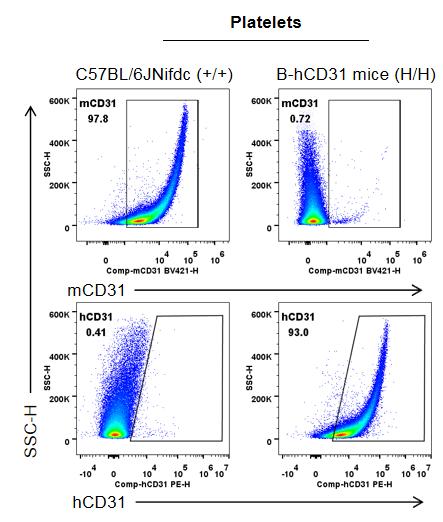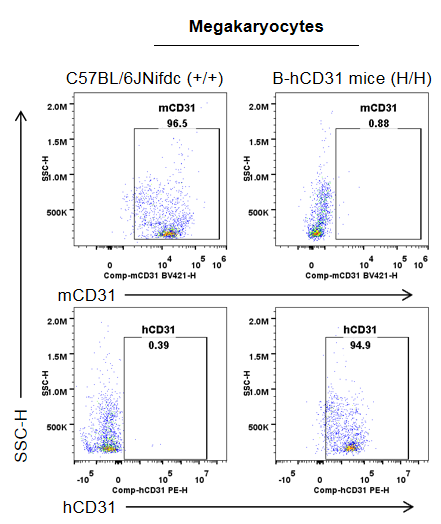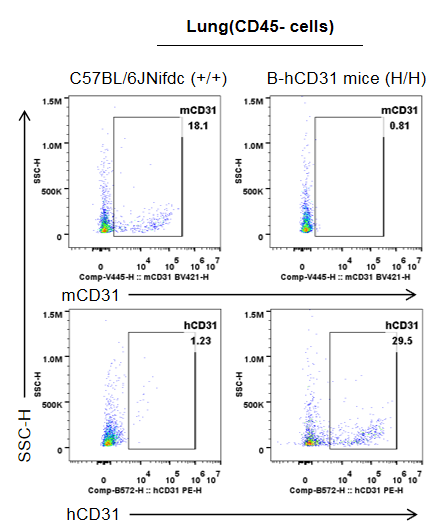B-hCD31 mice
| Strain Name |
C57BL/6-Cd31tm1(CD31)Bcgen/Bcgen
|
Common Name | B-hCD31 mice |
| Background | C57BL/6 | Catalog number |
112356 |
|
Related Genes |
CD31, CD31/EndoCAM, GPIIA', PECA1, PECAM-1, endoCAM |
||
|
NCBI Gene ID |
5175 | ||
- CD31 a 130 kDa type I transmembrane glycoprotein (also known as PECAM-1 or Endocam), which is expressed on platelets, endothelial cells and lymphocyte subsets.
- The exons 3-9 of mouse Cd31 gene that encode extracellular domain and part of transmembrane domain are replaced by human counterparts in B-hCD31 mice. The genomic region of mouse Cd31 gene that encodes cytoplasmic portion and signal peptide are retained. The promoter, 5’UTR and 3’UTR region of the mouse gene are retained. The chimeric CD31 expression is driven by endogenous mouse Cd31 promoter, while mouse Cd31 gene transcription and translation will be disrupted.
- Mouse CD31 was detectable on palates from blood of wild-type C57BL/6JNifdc mice.
- Mouse CD31 was detectable on megakaryocytes from bone marrow of wild-type C57BL/6JNifdc mice.
- Mouse CD31 was detectable on CD45- cells from lung of wild-type C57BL/6JNifdc mice.
- Human CD31 was detectable on palates from blood of B-hCD31 mice.
- Human CD31 was detectable on megakaryocytes from bone marrow of B-hCD31 mice.
- Human CD31 was detectable on CD45- cells from of B-hCD31 mice.
- Application: This product is used for pharmacodynamics and safety evaluation of drugs.
Targeting strategy
Gene targeting strategy for B-hCD31 mice. The exons 3-9 of mouse Cd31 gene that encode extracellular domain and part of transmembrane domain are replaced by human counterparts in B-hCD31 mice. The genomic region of mouse Cd31 gene that encodes cytoplasmic portion and signal peptide are retained. The promoter, 5’UTR and 3’UTR region of the mouse gene are retained. The chimeric CD31 expression is driven by endogenous mouse Cd31 promoter, while mouse Cd31 gene transcription and translation will be disrupted.
Protein expression analysis

Strain specific CD31 expression analysis in homozygous B-hCD31 mice by flow cytometry. Platelets were collected from wild-type C57BL/6JNifdc mice (+/+) and homozygous B-hCD31 mice (H/H), and protein expression was analyzed with anti-mouse CD31 antibody (Biolegend, 102423) and anti-human CD31 antibody (Biolegend, 303106) by flow cytometry. mCD31 was only detectable in platelets of wild-type C57BL/6JNifdc mice. hCD31 was only detectable in platelets of homozygous B-hCD31 mice, but not in wild-type C57BL/6JNifdc mice.

Strain specific CD31 expression analysis in homozygous B-hCD31 mice by flow cytometry. Megakaryocytes were collected from wild-type C57BL/6JNifdc mice (+/+) and homozygous B-hCD31 mice (H/H), and protein expression was analyzed with anti-mouse CD31 antibody (Biolegend, 102423) and anti-human CD31 antibody (Biolegend, 303106) by flow cytometry. mCD31 was only detectable in megakaryocytes of wild-type C57BL/6JNifdc mice. hCD31 was only detectable in megakaryocytes of homozygous B-hCD31 mice, but not in wild-type C57BL/6JNifdc mice.

Strain specific CD31 expression analysis in homozygous B-hCD31 mice by flow cytometry. Lung was collected from wild-type C57BL/6JNifdc mice (+/+) and homozygous B-hCD31 mice (H/H), and protein expression was analyzed with anti-mouse CD31 antibody (Biolegend, 102423) and anti-human CD31 antibody (Biolegend, 303106) by flow cytometry. mCD31 was only detectable in CD45- cells from lung of wild-type C57BL/6JNifdc mice. hCD31 was only detectable in CD45- cells from lung of homozygous B-hCD31 mice, but not in wild-type C57BL/6JNifdc mice.












 京公网安备:
京公网安备: